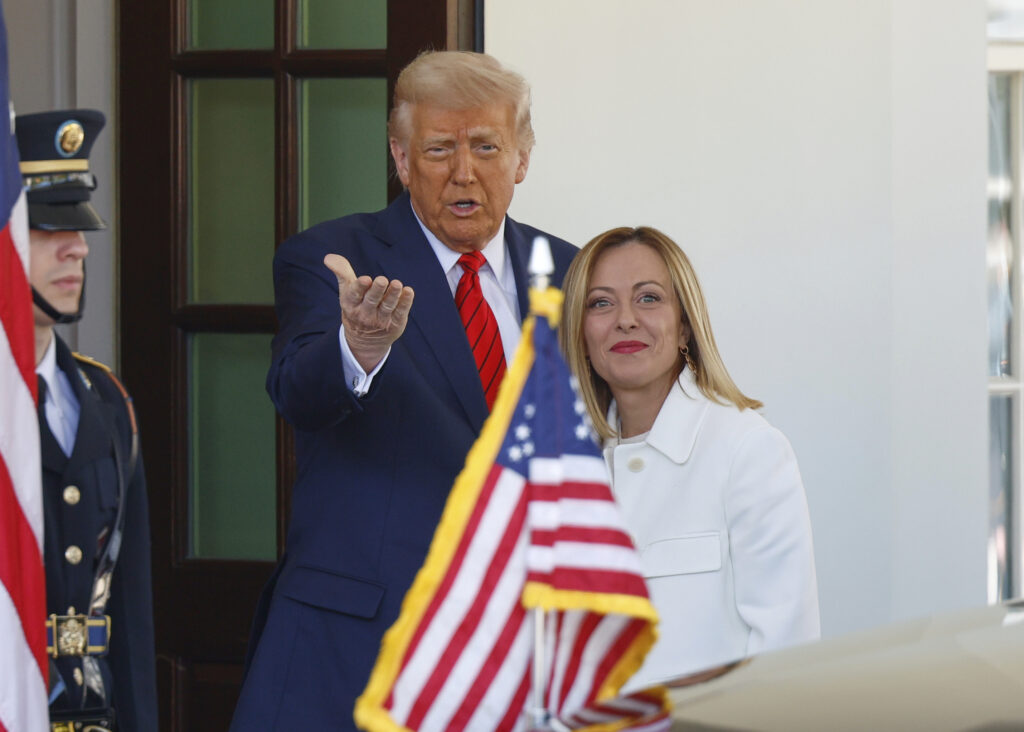
President Donald Trump, center, greets Italy's Prime Minister Giorgia Meloni, right, upon her arrival at the White House, Thursday, April 17, 2025, in Washington. (AP Photo/Tom Brenner)
Exploring the Prospects of a U.S.-EU Trade Deal Amidst Trump’s Confidence and Meloni’s Mediation
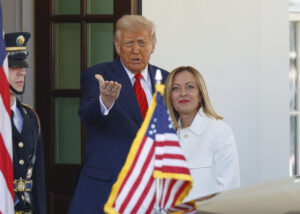
In April 2025, U.S. President Donald Trump expressed unwavering optimism regarding a potential trade agreement with the European Union, stating a “100%” chance of its realization. This declaration coincided with Italian Prime Minister Giorgia Meloni’s visit to Washington, D.C., where she positioned herself as a key mediator between the U.S. and EU. This development has significant implications for transatlantic relations, global trade dynamics, and the internal cohesion of the European Union.
“IMD Issues Alert: Thunderstorms and Rain May Disrupt Chennai’s Daily Life”
The Context: Rising Trade Tensions
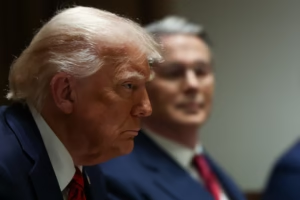
The backdrop to these discussions is a series of escalating trade tensions between the U.S. and the EU. Earlier in April, President Trump announced the imposition of substantial tariffs on European goods, including a 20% duty on EU exports and additional levies on automobiles, steel, and aluminum. In response to international criticism, Trump temporarily suspended these tariffs for 90 days, providing a window for negotiations
The European Union, with its $208.6 billion trade surplus with the U.S. in 2023, has been preparing for potential retaliatory measures. The EU’s ambassador to the U.S. indicated readiness to respond to any renewed trade disputes, though specific actions were not detailed
Trump’s Confidence: A “100%” Deal
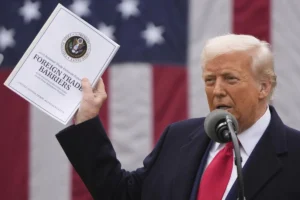
President Trump’s assertion of a “100%” chance for a trade deal with Europe reflects his characteristic assertiveness in trade negotiations. During a meeting with Prime Minister Meloni, Trump emphasized the attractiveness of the U.S. market and expressed confidence in reaching a fair agreement before the expiration of the current tariff suspension
This stance aligns with Trump’s broader trade policy approach, which has included renegotiating existing agreements and imposing tariffs to address perceived trade imbalances. His administration’s focus on bilateral deals over multilateral agreements has been a hallmark of his trade strategy.
Meloni’s Role: Bridging Transatlantic Relations
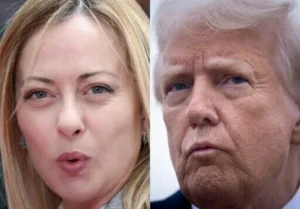
Prime Minister Giorgia Meloni’s visit to Washington underscores her strategic positioning as a bridge between the U.S. and the EU. Described as one of Trump’s closest EU allies, Meloni has advocated for a pragmatic and open approach to avoid a trade war. She has emphasized the importance of EU unity while also seeking to address specific concerns, such as the elimination of reciprocal duties on industrial products
Meloni’s efforts aim to de-escalate tensions and facilitate a mutually beneficial agreement. Her role as a mediator is particularly pertinent given the complexities of EU decision-making processes and the diverse interests of its member states.
EU’s Internal Dynamics: Challenges to Unity

While Meloni seeks to present a united European front, her bilateral engagement with Trump has raised concerns among other EU leaders. French officials have cautioned against undermining the EU’s collective negotiating position through separate discussions. The European Commission has acknowledged Meloni’s outreach as “very welcome” but emphasized that the EU alone has the mandate to negotiate trade agreements
These internal divisions highlight the challenges the EU faces in maintaining cohesion while addressing external pressures. The differing priorities and perspectives among member states complicate the formulation of a unified response to U.S. trade policies.
Global Implications: Economic and Strategic Considerations
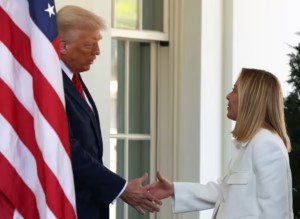
A successful U.S.-EU trade agreement could have far-reaching implications beyond bilateral relations. Economically, it could stabilize global markets by reducing trade uncertainties and fostering a more predictable trading environment. Strategically, it could reinforce the transatlantic alliance, counterbalancing the influence of other global powers.
Conversely, failure to reach an agreement may exacerbate existing trade tensions and potentially lead to retaliatory measures, disrupting global supply chains and affecting international trade dynamics.
Conclusion: A Pivotal Moment for Transatlantic Relations
The unfolding trade negotiations between the U.S. and the EU represent a critical juncture in transatlantic relations. President Trump’s assertive stance and Prime Minister Meloni’s mediatory efforts underscore the complexities of balancing national interests with collective objectives. The outcome of these discussions will not only shape future trade policies but also influence the broader geopolitical landscape.
As the 90-day tariff suspension period progresses, the international community will closely monitor developments, anticipating either a landmark agreement or a continuation of trade tensions that could redefine global trade relations in the years to come.





